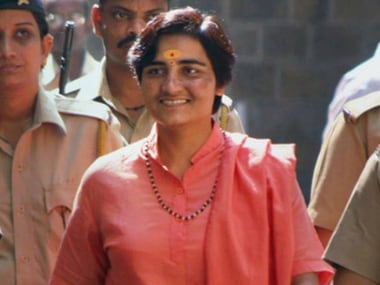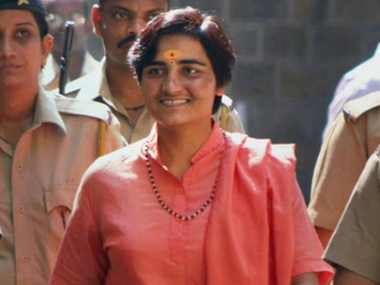The Bharatiya Janata Party’s decision to field Sadhvi Pragya Singh Thakur marks the emergence of the new-age Hindutva warrior in the political domain. The “original” sadhvi in politics, Union minister Uma Bharti possibly realised her time was up and announced the decision of not contesting the polls. Viewed alongside the denial of party nominations to former presidents Lal Krishna Advani and Murli Manohar Joshi and the former Bajrang Dal chief, Vinay Katiyar, Thakur’s nomination marks the total eclipse of the Sangh Parivar’s original Hindutva combatants. In the coming years, more of Thakur’s kind — the new-age Hindutva mascots — can be expected to be inducted into mainstream electoral politics. Thakur’s candidature also marks the demise of the era of genteel campaigns by Hindutva warriors atop Light Commercial Vehicles redesigned as raths or chariots. In its place, we now have motorbike riding, even activists wielding guns or other lethal arms. Thakur, who was considered in the initial part of the tenure of Prime Minister Narendra Modi as part of the “fringe force”, now symbolises those who have become mainstream in the past five years. The “grandeur” of the past agitations or protest marches, with greying leaders waving courteously to assembled throngs, has yielded to the macho motorcycle-riding Hindutvawadi. The protesting Hindu is not just angry, but among those agitating for redressal of the community’s grievances, is the Alpha Protester. Thakur epitomises them, now as a BJP candidate. [caption id=“attachment_6474881” align=“alignleft” width=“380”]  File image of Sadhvi Pragya Singh, accused in the 2008 Malegaon blast case and the BJP’s candidate from Bhopal. PTI[/caption] There could be no better mainstreaming of the politically impatient Hindu, for whom violence is no longer a strict no-no. Those believing in Hammurabi’s modified credo — bomb-for-bomb — need not lurk in dark alleys any more, but can march in daylight on New Delhi’s broad avenues which go right up to Parliament. Criminality in Indian elections is not new and there is virtually no party which has not fielded candidates with a criminal past. Yet, Thakur is in a different league . To put the record straight, she is yet to be acquitted of all charges and is currently out on bail. She faces trial under rigorous sections of The Unlawful Activities Prevention Act (UAPA) in a Mumbai court. By nominating her to contest from Bhopal against Digvijaya Singh, the BJP has given precedence to its appraisal over a judicial verdict. The party has claimed often in the past, most recently after the Samjhauta blast accused were acquitted, that the UPA government concocted cases against activists of the Sangh Parivar to give Hindus a bad name. Thakur’s nomination indicates the BJP’s unwillingness to wait for the due process of law to be completed. It also enables the party to feed on Hindu victimhood by showcasing her years in detention as an example of the extent to which “anti-nationals” can go to “put down Hindu interests” and the “nation”. In many ways, her nomination is similar to Amit Shah’s appointment as party president in 2014 although charges were pending against him in the Sohrabuddin Sheikh and Tulsiram Prajapati fake encounter cases. In both instances, the party’s verdict has been given priority over that of the judiciary. This obviously contains clever, although questionable, political messaging. The first message is discernible from the different paths of Bharti and Thakur to their political debut. Both began in similar circumstances although separated by couple of decades — by delivering religious sermons. But while Bharti was picked out at the initiative of Rajmata Vijayaraje Scindia solely for oratory and memory, Thakur has been chosen for her vitriolic ability and for what she has come to represent — the indomitable Hindu spirit which knows no Laksman Rekha and the characteristics to opt for the extreme without batting an eyelid. There could not have been a better symbolic target than Digvijaya Singh to let loose the new-age Hindutva mascot. He, after all, has been at the forefront of the ideological battle against the Sangh Parivar. In fact, there was a time when he was among the few cocking a snook at the saffron fold when the majority in his party, including the leadership, was found wilting. This is, thus, not a personal war between a recent lateral entrant in politics and someone who has been at it for decades. There are more fundamental issues to this contest and the direction of how these would be resolved would be known only after the people’s verdict is known. The Bhopal electorate would not be just choosing its own representative, but much more. Since 2014, the BJP has repeatedly given dramatic twists midway to the electoral campaign. This time such a possibility had appeared remote, because the Pulwama massacre and the subsequent government retaliation has been a major part of the BJP’s campaign. But Thakur’s nomination has pushed the BJP campaign to a point of no return. Categorical corroboration of this comes in the form of Thakur’s words when asked what will be her plank in the polls. “Bhagwa ko samman” (respect for the saffron colour) topped her list of promises. She intends to point out that despite being a sanyasi, she was tortured. Further, Thakur added that people who threaten the country would not go scot free, although she did not elaborate on what she construed as intimidating or terrorising the nation. She also suggested that a dharm yudh (religious war) had started with her decision to join the BJP and enter the electoral fray. Significantly, she made no mention of development or other crises facing the people — be it lack of jobs, non-remunerative farm prices or declining non-agricultural rural incomes. Although Modi has been at pains in his recent interviews that his election speeches devote more time to issues of development rather than those related to national security and nationalism, the BJP’s mid-level leaders and foot soldiers are focussing on emotive issues centred around religious identity. Although Thakur’s induction and subsequent nomination hold the promise of consolidating the core Hindutva base of the party, the move also runs the risk of repelling the last of the right-wing liberals, although many consider this to be an oxymoron. The BJP’s electoral chariot in 2014 ran on several wheels, which included development, change, hope and, of course, Hindutva. This time, especially after Thakur’s candidature, it appears the party is depending on just one wheel, and is hoping that it will take it home.
Sadhvi Pragya Singh Thakur’s nomination by the BJP marks the total eclipse of the Sangh Parivar’s original Hindutva combatants.
Advertisement
End of Article


)
)
)
)
)
)
)
)
)



